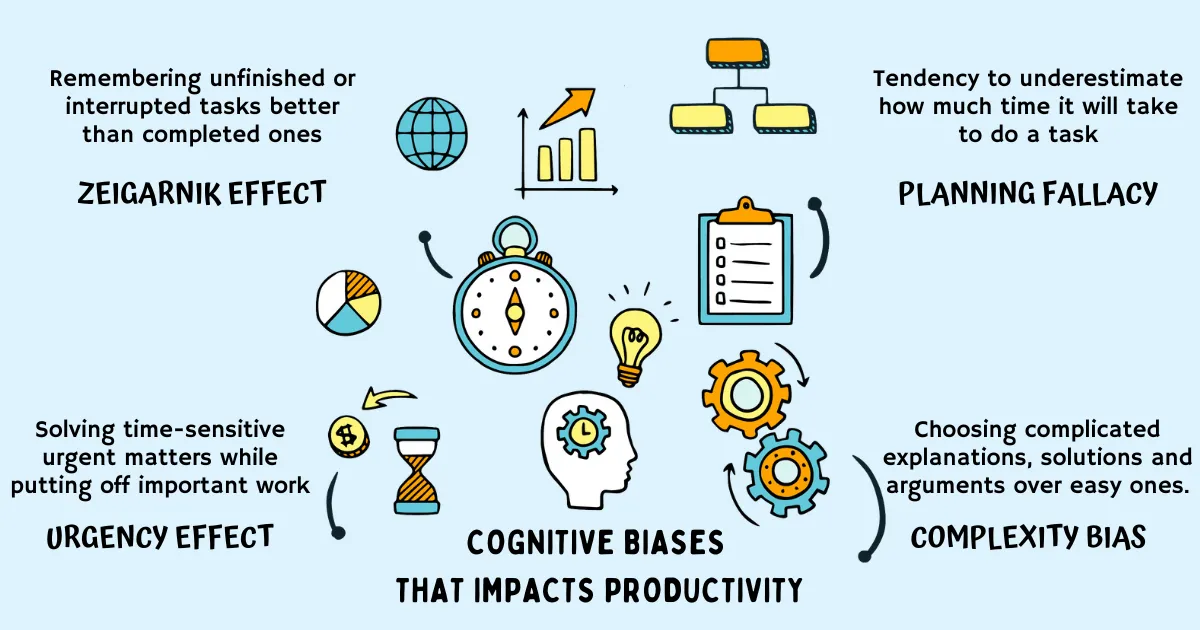Cognitive Biases
Mental shortcuts that lead to thinking errors. 1
The 4 cognitive biases that have the biggest impact on our productivity — how we prioritize, make decisions, manage time, and get work done.
- Urgency effect
- Zeigarnik effect
- Complexity bias
- Planning fallacy
Urgency effect
Rationally our brain knows that important tasks have a larger payoff and bigger rewards in the long run, but under the effect of this bias, we fall victim to perceiving urgent as important.
Urgent tasks keep us busy and make us feel important, but they also suck into our time. Prioritizing it at the expense of more impactful work keeps us trapped in an illusion of productivity.
Important tasks typically have no specific deadline.
Urgent tasks have easy-to-reach, visible goals. They bring instant gratification with a big hit of dopamine.
How to avoid urgency effect
- Important and Urgent (The Eisenhower Matrix Quadrant 1): reduce time spent here
- Important and Not Urgent (The Eisenhower Matrix Quadrant 2): consciously prioritize and schedule these tasks
Consciously scheduling dedicated hours on the calendar to do important work makes it more likely that you attend to them without interruptions.
Zeigarnik effect
Thoughts of unfinished tasks keep popping up in our head right when we get down to work or are trying hard to focus.
- Emails we haven’t replied to.
- Pending design to compete.
- Meetings to schedule.
- … so on and on.
Distractions from incomplete work prevent us from entering into a state of flow.
The effect refers to the tendency to remember unfinished or interrupted tasks better than completed ones.
Human minds treat tasks that have been completed differently from those that are still left to complete.
Planning work upfront and writing it down can free your mind from distracting thoughts about unfinished work.
When you miss something and it pops up in your head, don’t leave it hanging there, immediately write it down.
Moving tasks from your head onto paper relaxes your brain and helps you focus on the task at hand.
Complexity bias
Knowing up front that something i sdifficult can prevent us from getting started.
Complexity bias is the tendency to prefer complicated explanations, solutions, and arguments over easy ones.
Complexity in such cases could be an excuse to label the problem as too confusing and shove it aside.
Planning fallacy
When it comes to setting deadlines, most of us are highly optimistic.
Summary
- Most of us struggle with getting work done efficiently because we don’t pay attention to the cognitive biases that get in the way of using time productively.
- Urgency effect makes us waste time attending to urgent tasks at the cost of important tasks. Not paying attention to the future needs keeps us trapped in a cycle of unproductivity.
- The Zeigarnik effect prevents us from giving our best to the task at hand. When our mind keeps reminding us of incomplete or interrupted tasks, it’s hard to stay focused and pay attention.
- Complexity bias makes us add unnecessary complexity to solutions which increases the time, effort, and cost to solve even simple problems.
- Planning fallacy tricks our mind to give highly optimistic estimates to achieve a certain goal despite our previous experience telling us that it will be impossible to achieve it.
